Online CACFP Training
Powered by Bright Track
24/7 Access
Complete your online training 24/7. Training is self-directed.
Earn Certificates
Earn a certificate of training for completing your required annual CACFP training.
Any Location
Complete your training from any location. All you need is Internet access.
New to Bright Track? Start here!
Online Course Catalog
New versions of many courses are available at the start of each program year (October 1) for users who want to earn a new certificate. More information on retaking courses is available in the Help menu.
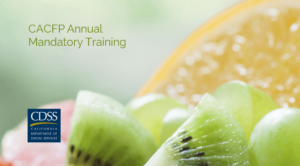
2024-2025 CACFP Annual Mandatory Training (CDSS-110)
This course is designed for returning Child and Adult Care Food Program (CACFP) staff and will review the regulations and procedures of the CACFP to assist CACFP Operators with regulatory compliance.
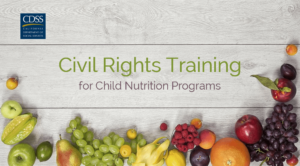
2024-2025 Civil Rights Training (CDSS-150)
Program institutions and facilities receiving federal financial assistance are required to comply with federal civil rights laws to ensure all child nutrition program participants have equal access to all benefits and services. This course will review civil rights regulations, and provide all information necessary to ensure that your program is in compliance with these requirements.
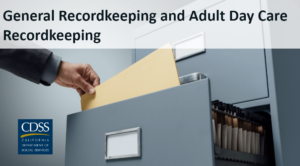
2024-2025 General Recordkeeping and Adult Day Care Recordkeeping (CDSS-615)
This course focuses on CACFP recordkeeping requirements for Adult Day Care programs. The course addresses program eligibility, operational requirements, enrollment, participant eligibility, meal pattern flexibilities, and miscellaneous recordkeeping requirements.
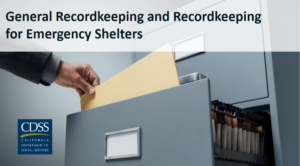
2024-2025 General Recordkeeping and Recordkeeping for Emergency Shelters (CDSS-614)
This course focuses on general CACFP recordkeeping requirements in lesson 1. In lesson 2, recordkeeping requirements for Outside School Hours Care Centers is discussed more specifically. The course addresses program eligibility, operational requirements, enrollment, participant eligibility, and miscellaneous recordkeeping requirements.
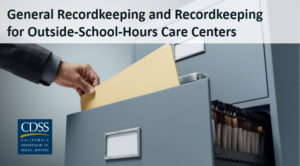
2024-2025 General Recordkeeping and Outside-School-Hours Care Centers Recordkeeping (CDSS-613)
This course focuses on general CACFP recordkeeping requirements in lesson 1. In lesson 2, recordkeeping requirements for Outside School Hours Care Centers is discussed more specifically. The course addresses program eligibility, operational requirements, enrollment, participant eligibility, and miscellaneous recordkeeping requirements.

2024-2025 General Recordkeeping and At-Risk Afterschool Meals Program Recordkeeping (CDSS-612)
This course focuses on general CACFP recordkeeping requirements in lesson 1. In lesson 2, recordkeeping for At-Risk Afterschool Meals Programs is discussed more specifically. The course addresses program eligibility, operational requirements, enrollment, participant eligibility, and miscellaneous recordkeeping requirements.
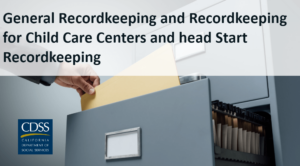
2024-2025 General Recordkeeping and Child Care Centers and Head Start Recordkeeping (CDSS-611)
This course focuses on general CACFP recordkeeping requirements in lesson 1. In lesson 2 recordkeeping for Child Care Centers and Head Start programs will be discussed. The course addresses program eligibility, operational requirements, enrollment, participant eligibility, and miscellaneous recordkeeping requirements.

2024-2025 Maintaining a Nonprofit Food Service Program (CDSS-610)
All CACFP institutions must maintain a nonprofit food service program. This course includes two lessons that cover the evaluation of program revenue and expenses, financial recordkeeping and controls, and expectations with operating a nonprofit CACFP.

2024-2025 Sponsor Monitoring (CDSS-609)
This course reviews monitoring requirements, staffing, completing monitoring reports, and conducting the five-day reconciliation.

2024-2025 Crediting Foods in CACFP (CDSS-605)
This course goes into detail on crediting foods in the CACFP. The course discusses Child Nutrition labels, Product Formulation Statements, and standardized recipes.

2024-2025 Meal Counting, Claiming and Documentation for Centers (CDSS-604)
Submitting a claim for CACFP reimbursement requires detailed recordkeeping and preparation prior to the submission. This course reviews requirements related to point of service meal counts, attendance documentation, the edit check process, consolidation, and claim submission.

2024-2025 CACFP Enrollment (CDSS-602)
This course covers the enrollment process for applicable programs, completed Enrollment Forms, and annual update requirements.

2024-2025 Eligibility Determination (CDSS-601)
Meal Benefit Forms (MBFs) are required to determine the free, reduced-price, and base or paid eligibility categories for CACFP participants. This course reviews MBF requirements, demonstrates determining income eligibility, and discusses annual update requirements.

2024-2025 Food Safety Essentials (CDSS-555)
Spend the next hour with us learning about basic food safety and sanitation principles! We’ll review why food safety is an integral part of your operations, the dangers of foodborne illness, and how to apply these lessons to your day-to-day tasks and activities. This course will also cover motivating employees to follow food safety processes and protocols. Feeding children and adults is a noble profession – don’t let a food safety slip mar the reputation of your program!

2024-2025 Family Style Meal Service – Building Better, Healthier, Menus and Eating Habits (CDSS-514)
Family style meal service has the opportunity to teach children so much more than just how to eat. Learn the benefits of family style meal service, best practices to incorporate it into your meal service option, and what you must do to maintain CACFP Compliance. In addition, participants will learn best practices for conversation starters around the meal table, how to encourage staff to role model positive eating behaviors, and what equipment is needed for family style meal service success.
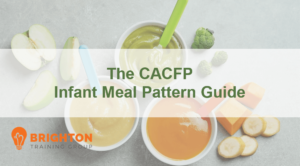
2024-2025 CACFP Infant Meal Pattern Guide (CDSS-506)
One of the hardest parts of planning a CACFP menu is understanding if a food is creditable or not and how much you need to serve. In this brief overview, participants will learn about tools to guide them to determine if an infant food is creditable to the CACFP meal pattern, and how much they need to serve to be in compliance.

2024-2025 A CACFP Meal Pattern Guide (CDSS-505)
One of the hardest parts of planning a CACFP menu is understanding if a food is creditable or not and how much you need to serve. In this brief overview, participants will learn about tools to guide them to determine if a food is creditable to the CACFP meal pattern, and how much they need to serve to be in compliance.
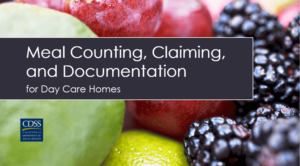
2024-2025 Meal Counting, Claiming, and Documentation for Day Care Homes (CDSS-211 Program 5)
CACFP Annual Training for Homes is a 1 hour comprehensive online course designed to provide annual required training for day care homes participating in the CACFP.

2024-2025 Procurement for CACFP Operators (CDSS-181)
All CACFP operators must procure all goods and services through competitive practices while following all applicable federal regulations as set forth in Title 2, Code of Federal Regulations (2 CFR), sections 200.318–326 and Title 7, Code of Federal Regulations (7 CFR), sections 226.6(i), 226.21 and 226.22. This course will define procurement and will provide an overview of the types of procurement methods, strategies for local purchasing, and purchasing from a Food Service Management Company. Lastly, participants will understand the federal requirement that all CACFP Operators must develop and maintain two procurement documents: Written procurement procedures and a written code of conduct.
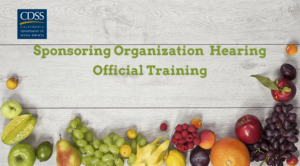
2024-2025 Sponsoring Organization Hearing Official Training (CDSS-160)
This course is designed for returning Child and Adult Care Food Program (CACFP) staff and will review the regulations and procedures of the CACFP to assist CACFP Operators with regulatory compliance.
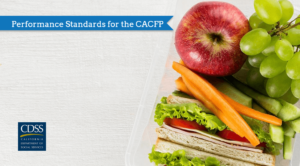
2024-2025 CACFP Performance Standards (CDSS-130)
CACFP regulations require that all new and participating CACFP institutions meet and maintain compliance with the three Performance Standards; Financial Management and Viability, Administrative Capability, and Program Accountability. This course is designed to guide CACFP institutions to better understand the importance of the Performance Standards, the reason that they were developed, and the criteria used to determine compliance.
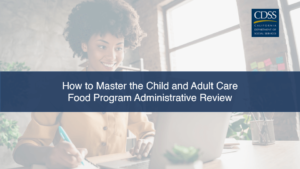
2024-2025 How to Master the CACFP AR (CDSS-001)
This training describes the Administrative Review (AR) process and provides valuable information for users with the goal to increase knowledge of the CACFP AR process, increase confidence in meeting program requirements and oversight, provide tips for organizing and providing all requested documents at the start of the AR, and provide useful tips to avoid AR findings.

Purchase Smarter, Not Harder (CDSS-564)
This lesson provides information about different purchasing options available to CACFP institutions that will not only help minimize the workload and cost of planning and implementing an effective food program but also make sure that the food program is still able to offer high-quality, nutritious foods.
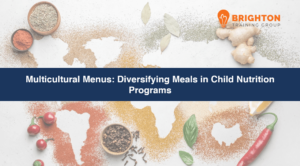
Diversifying Meals in Child Nutrition Programs (CDSS-570)
Multicultural Menus: Diversifying Meals in Child Nutrition Programs is a 1-hour training course designed to provide Child Nutrition Program operators with the skills they need to incorporate regionally diverse meals into their program. This training covers important topics including the importance of providing multicultural meals, methods of implementing a taste test, and ways to adapt menus to provide a range of multicultural dishes.

